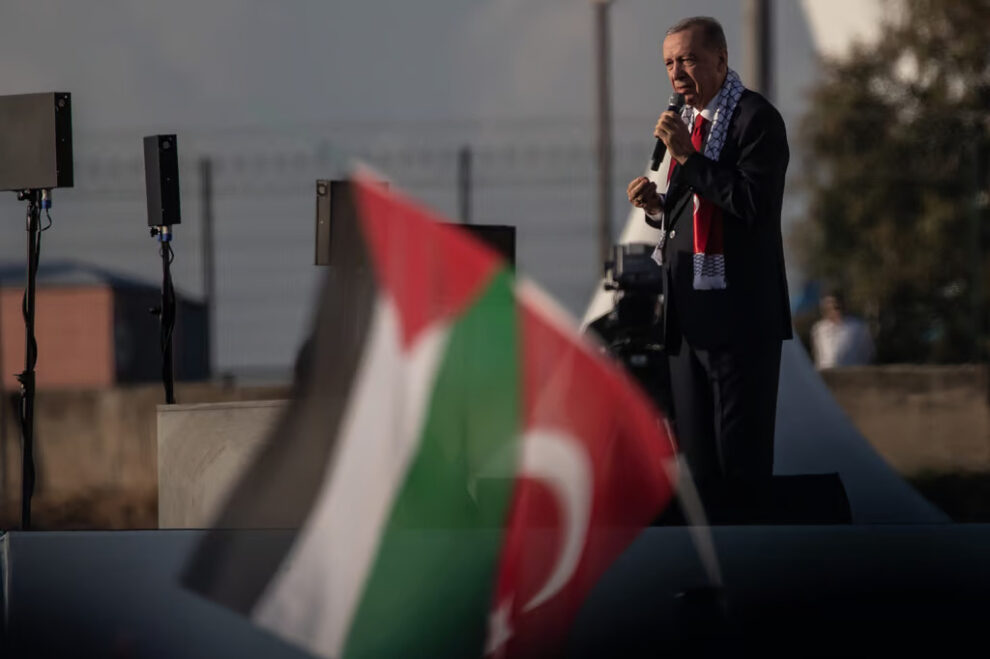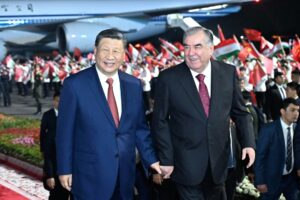BERLIN — For German leaders, it’s never easy when Turkish President Recep Tayyip Erdoğan comes to town. This time, things could hardly be more difficult.
Since the outbreak of the Israel-Hamas war, Erdoğan has made it exceedingly clear on whose side he stands. He has referred to Hamas, designated a terrorist organization by the European Union and the United States, as a “liberation group” that is “waging a battle to protect its lands and people.” He has called Israel, by contrast, a “terror state” and accused it of embracing “fascism.”
Addressing his parliamentary group this week, Erdoğan added a note of menace: “Israel,” he said, “your end is near.”
On Friday Erdoğan will arrive for an official visit in Berlin, where he’ll meet with Chancellor Olaf Scholz and President Frank-Walter Steinmeier. The talks are likely to be intensely pained.
After an initial attempt to play a diplomatic and mediating role in the war, Erdoğan has flipped to become one of the most vociferous backers of Hamas among Middle East leaders, angering Turkey’s European and U.S. allies in the process. For the German government, Erdoğan’s rhetoric creates a particular problem, in great part because he is widely admired among Turks in Germany, home to the world’s largest Turkish diaspora.
German leaders proclaim that, due to their country’s Nazi past and historical responsibility for the Holocaust, Israel’s existence and security is a “Staatsräson,” or an ideal that is core to Germany’s identity as a state. As such, some in Germany have argued that Erdoğan should have been disinvited — or should at least be publicly rebuked for any pro-Hamas comments during his visit.
“I expect very clear words from Olaf Scholz and also from the president aimed at these unbearable statements by Erdoğan,” said Ricarda Lang, co-chair of the Greens.
The Turkish president’s comments have further stressed already-taxed relations with EU and U.S. leaders, for whom the question has arisen: When do Erdoğan’s words and deeds go too far, leading to a deeper rupture?
Erdoğan has a long history of making incendiary statements — and not only about Israel. In 2017, after Dutch government authorities banned a rally in Rotterdam where Turkey’s foreign minister was scheduled to appear, Erdoğan called them “Nazi remnants and fascists.” That same year, when then-Chancellor Angela Merkel said the EU should reconsider its relationship with Turkey, Erdoğan described her stance as “Nazism.”
The difficultly with Erdoğan isn’t merely rhetorical. His increasingly authoritarian hold on the Turkish state, courts and media has made that country’s EU accession bid an almost purely theoretical concept — virtually unimaginable, as things now stand.
Yet EU and U.S. leaders still calculate that their interests are best served by maintaining acceptably stable relations with Erdoğan. Turkey is, after all, a NATO member and is seen as critical to regional security. For Scholz in particular, ties with Erdoğan are key to his government’s aim of reducing the number of asylum seekers entering the EU from Turkey.
Erdoğan is well-known for his willingness to use this leverage to extract concessions. He has long delayed Sweden’s bid to join NATO, for instance, prompting Sweden to reverse a ban on exporting military equipment to Turkey, among other concessions, in an effort to win Erdoğan’s favor.

He has also often shifted positions quickly, keeping other leaders guessing about his intentions.
“Nothing surprises me about what he might do,” Nancy Pelosi, the former speaker of the US House of Representatives, said of Erdoğan during a visit to Berlin last week.
Prior to the Israel-Hamas war, in fact, Erdoğan had been pursuing closer ties with Israel. In September he met with Israeli Prime Minister Benjamin Netanyahu in person for the first time on the margins of the U.N. General Assembly in New York.
Those days seem long gone. Erdoğan is now both fomenting and feeding off Turkish outrage over civilian deaths due to Israel’s bombardment of Gaza.
Analysts say Erdoğan aspires to be the paramount leader of the Islamic world, and has few qualms about upsetting European and U.S. allies in the process.
“We have kind of coddled him and allowed him to do whatever he wants without punishment,” said Henri J. Barkey, an adjunct senior fellow for Middle East studies at the Council on Foreign Relations in the U.S. “We do not push back. That’s why he gets away with it.”
For Germany, there is a further concern.
About three million people of Turkish descent live in Germany, 1.5 million of whom have Turkish citizenship and thus the right to vote in Turkish elections.
Some 67 percent of Turkish voters in Germany supported Erdoğan in Turkey’s run-off presidential election in May, far higher than the percentage of people who supported him in Turkey itself.
Erdoğan’s pro-Hamas rhetoric could now radicalize many of his ardent supporters, said Burak Çopur, a German political scientist specializing in Turkey, migration and radicalization.
Erdoğan, he said, is “pouring oil on the fire.”
Source : politico















